Vintage Treasures: The Great Science Fiction Series, edited by Frederik Pohl, Martin H. Greenberg and Joseph D. Olander
One of the things I like to do with Vintage Treasures posts is to shine a light on fascinating genre books from the 20th Century, and point out how inexpensive they are. Everyone like to share their hobbies; mine is collecting science fiction paperbacks and — unlike stamp or coin collecting, say, or vintage toys — virtually the entire field is available to you. With the exception of unique autographed items and the like, I’m unaware of a single science fiction paperback, no matter how rare, that costs more than a few hundred dollars. I’ve collected tens of thousands, and I’m pretty sure I’ve never paid more than 20 bucks for any one of them.
Hardcovers, of course, are a different story. I’ve dealt with a few extremely collectible books (remind me to tell you the tale of the most valuable book in my collection, the Meisha Merlin edition of A Game of Thrones, some time), but it’s not something I make a habit of. In general I stay away from the limited edition collectible market, which I think is a particular disease that afflicts collectors like me.
But every once in a while I’ll stumble on a rare or collectible title that piques my interest. That’s exactly happened with The Great Science Fiction Series, a 1980 Harper & Row hardcover anthology edited by Frederik Pohl, Martin H. Greenberg and Joseph D. Olander, which I found on eBay over the summer. I was struck by it for three reasons. One, because I’d never seen it before, and I certainly thought I was familiar with all of Fred Pohl’s anthologies by now. Two, I thought it was a great idea: a collection of twenty stories from the best SF series from 1944-1980, each with an accompanying essay by the author. And three, it was ridiculously expensive, over $140. A quick search on AbeBooks confirmed that copies were available, starting around $80. Used copies on Amazon started at over $100.
I couldn’t find any literature that explained why the book was so pricey, but it didn’t seem any particular mystery. Likely copies were very scare, which would explain why I’d never seen it. There’s never been a reprint, paperback or otherwise. The book simply wasn’t very well known. Of course… if it wasn’t very well known, that meant that sooner or later someone would sell a copy without knowing what they had. I set an automated eBay search, and sure enough I got a hit less than two months later. That’s how I acquired the virtually new copy above for less than $20.
[Click the images for Series-sized versions.]
And I’m very pleased I did. The book may have had a limited print run, but that doesn’t mean my instincts weren’t correct. It turns out to be a worthwhile read indeed, not just for the stories themselves, which serve as excellent introductions to many of the most popular SF story series of the 50s, 60s and 70s, but for the 2-page intros, which I found absolutely fascinating. Here’s a snippet from Robert Sheckley’s intro to “The Lifeboat Mutiny” (from Galaxy, April 1955), the fifth tale in The AAA Ace Series, which I frankly had never heard of.
I suspect that the AAA Ace stories derived a measure of unconscious inspiration from certain beloved movies of the 1940s. The sort of movie I’m referring to typically starred Clark Gable and Spencer Tracy. There were these two pals, see, and they started a crazy business together, and the movie would be about the crazy, funny things that happened to them…
The [first] story was popular with readers, and Horace Gold, then editor of Galaxy, suggested that I try a few more. Something about the characters and the basic absurdity of their situation must have appealed to me: I wrote six more, and I’m not a writer who tends to work in series…
The stories were always popular with readers, less so with my colleagues. At the time I wrote them in the mid-fifties, science fiction was going through one of its serious, heavy, literary phases, and the beau ideal was long stories about people going crazy under ambiguous circumstances, or tone poems to changelings on gossamer worlds. My AAA Ace stories were dismissed by various critics as being “facile,” “slick,” and much too well plotted These critics acted as if that were an easy way to write, when quite the opposite is true: the easiest thing in the world is to write any number of thousands of words from the viewpoint of a man going insane in a literary manner on an alien planet. (Well, even that isn’t easy if you take it seriously, as I was to do some years later.”)
Here’s the whole thing for those of you who find this sort of grumbling, behind-the-scenes genre history as fascinating as I do. (Click for a more legible version.)
I expected the book to focus on bestselling properties like McCaffrey’s Dragonriders, Asimov’s Foundation, and Frank Herbert’s Dune, but that’s not the case at all. Yes, there are a few of the usual suspects, such as Niven Known Space tale, a City story by Clifford D. Simak, and an entry in Fred Saberhagen’s epic Berserker saga. But by and large the focus isn’t on novels, but rather story cycles that appeared in magazines, like Bob Shaw’s Slow Glass, Cordwainer Smith’s Instrumentality of Mankind, Brian Aldiss’ Hothouse, J.G. Ballard’s Vermillion Sands, and Keith Laumer’s Retief.
In fact, the TOC has more than a few surprises, such as Asimov’s contribution, an entry in his Wendell Urth series. I’ve been an Asimov fan for 40 years, but I haven’t a clue who the heck Wendell Urth is. And then there’s Fritz Lieber’s entry, a rousing tale of sword & sorcery featuring two of the most famous adventurers in all fantasy, Fafhrd and the Gray Mouser, in… erm scratch that, it’s a Change War novella (Change War??)
The Great Science Fiction Series is the kind of book that makes me regret I didn’t come across it decades ago. Even today, it helped me discover more than a couple series I’m unfamiliar with, like Wilmar H. Shiras’ Children of the Atom, and James Blish’s Surface Tension tales (and let’s not forget Wendell Urth.)
It’s unfortunate the book wasn’t more well known when it was first released. It would have made a marvelous addition to any decent science fiction library — especially since, in those pre-Google and pre-ISFDB days, every entry in the book came with a helpful Bibliography to assist you in tracking down all the stories.
The Bibliography for Robert Sheckley’s AAA Ace series
In fact, looking back at the last twelve months of Vintage Treasures, if I were forced to select a single book I’d like to see reprinted, I think it would be this one. As indispensable as it might have been to science fiction collectors in the early 80s, I believe it would be even more valuable today as a delightful introduction to some of the most popular and entertaining — and in many cases, almost forgotten — SF series of the 20th Century. I’ve certainly greatly enjoyed my time with it.
I’ve also enjoyed taking all these photos and sharing them with you. Of course, that’s not without its hazards. This is what happened the moment I showed the slightest interest in something in my lap.
Who says cats don’t read science fiction.
Here’s the complete Table of Contents for The Great Science Fiction Series.
Introduction by Frederik Pohl
Hothouse — “Hothouse” by Brian W. Aldiss (The Magazine of Fantasy and Science Fiction, February 1961)
Nicholas van Rijn Series/Technic History — “A Little Knowledge” by Poul Anderson (Analog Science Fiction/Science Fact, August 1971)
The Wendell Urth Series — “The Talking Stone” by Isaac Asimov (The Magazine of Fantasy and Science Fiction, October 1955)
Vermilion Sands — “The Cloud-Sculptors of Coral D” by J. G. Ballard (The Magazine of Fantasy and Science Fiction, December 1967)
Cities in Flight — “Bridge” by James Blish (Astounding Science Fiction, February 1952)
Surface Tension/The Pantropy Series — “Surface Tension” by James Blish (Galaxy Science Fiction, August 1952)
Feghoot — “Through Time and Space with Ferdinand Feghoot” by Reginald Bretnor (The Magazine of Fantasy and Science Fiction, May 1956)
The White Hart — “The Reluctant Orchid” by Arthur C. Clarke (Satellite Science Fiction, December 1956)
Tales from Gavagan’s Bar — ‘The Ancestral Amethyst” by L. Sprague de Camp and Fletcher Pratt (The Magazine of Fantasy and Science Fiction, August 1952)
The People — “Ararat” by Zenna Henderson (The Magazine of Fantasy and Science Fiction, October 1952)
Retief –“Ballots and Bandits” by Keith Laumer (If, September-October 1970)
The Change War — “No Great Magic” by Fritz Leiber (Galaxy Magazine, December 1963)
The Dragonriders of Pern — “The Smallest Dragonboy” by Anne McCaffrey (Science Fiction Tales, 1973)
Helva/The Ship Who Sang — “The Ship Who Sang” by Anne McCaffrey (The Magazine of Fantasy and Science Fiction, April 1961)
Known Space — “A Relic of the Empire” by Larry Niven (If, December 1966)
Berserker — “Sign of the Wolf” by Fred Saberhagen (If, May 1965)
Slow Glass — “Burden of Proof” by Bob Shaw (Analog Science Fiction/Science Fact, May 1967)
The AAA Ace Series — “The Lifeboat Mutiny” by Robert Sheckley (Galaxy Science Fiction, April 1955)
In Hiding/Children of the Atom — “Opening Doors” by Wilmar H. Shiras (Astounding Science Fiction, March 1949)
City — “Aesop” by Clifford D. Simak (Astounding Science Fiction, December 1947)
The Instrumentality of Mankind — essay by John J. Pierce, and “The Game of Rat and Dragon” by Cordwainer Smith (Galaxy Science Fiction, October 1955)
Notes on Contributors
Copyrights
The Great Science Fiction Series was published by Harper & Row in November 1980. It is 420 pages, priced at $16.95 in hardcover. The cover was designed by Jon Weiman. It has never neen reprinted, and there is no digital edition.
See all our recent Vintage Treasures here.
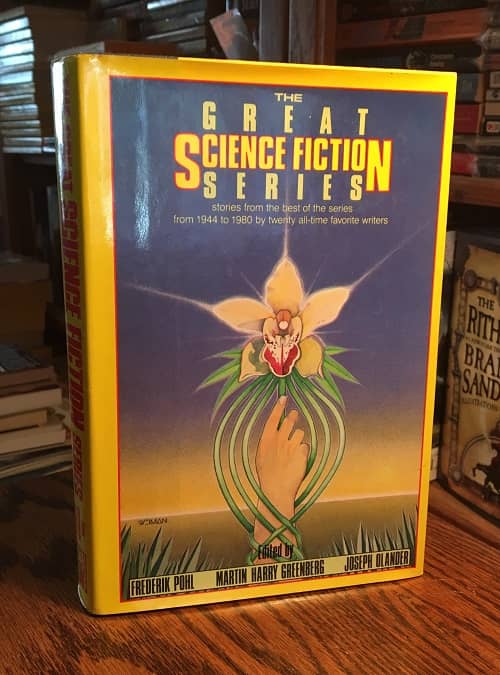
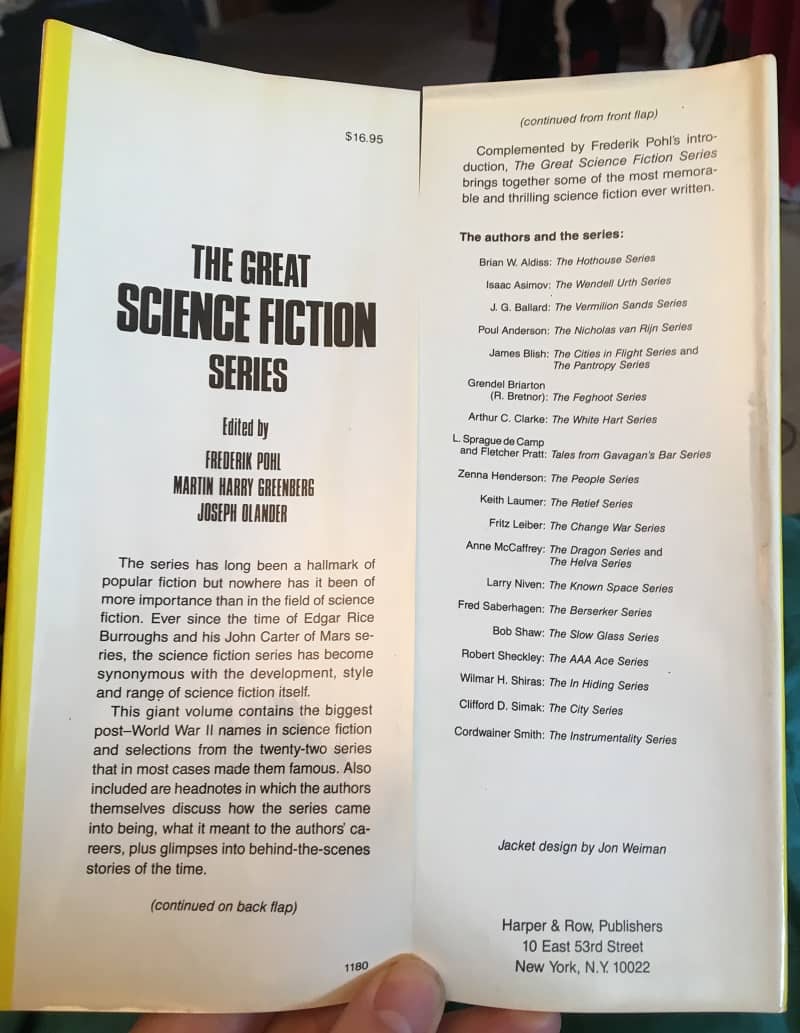
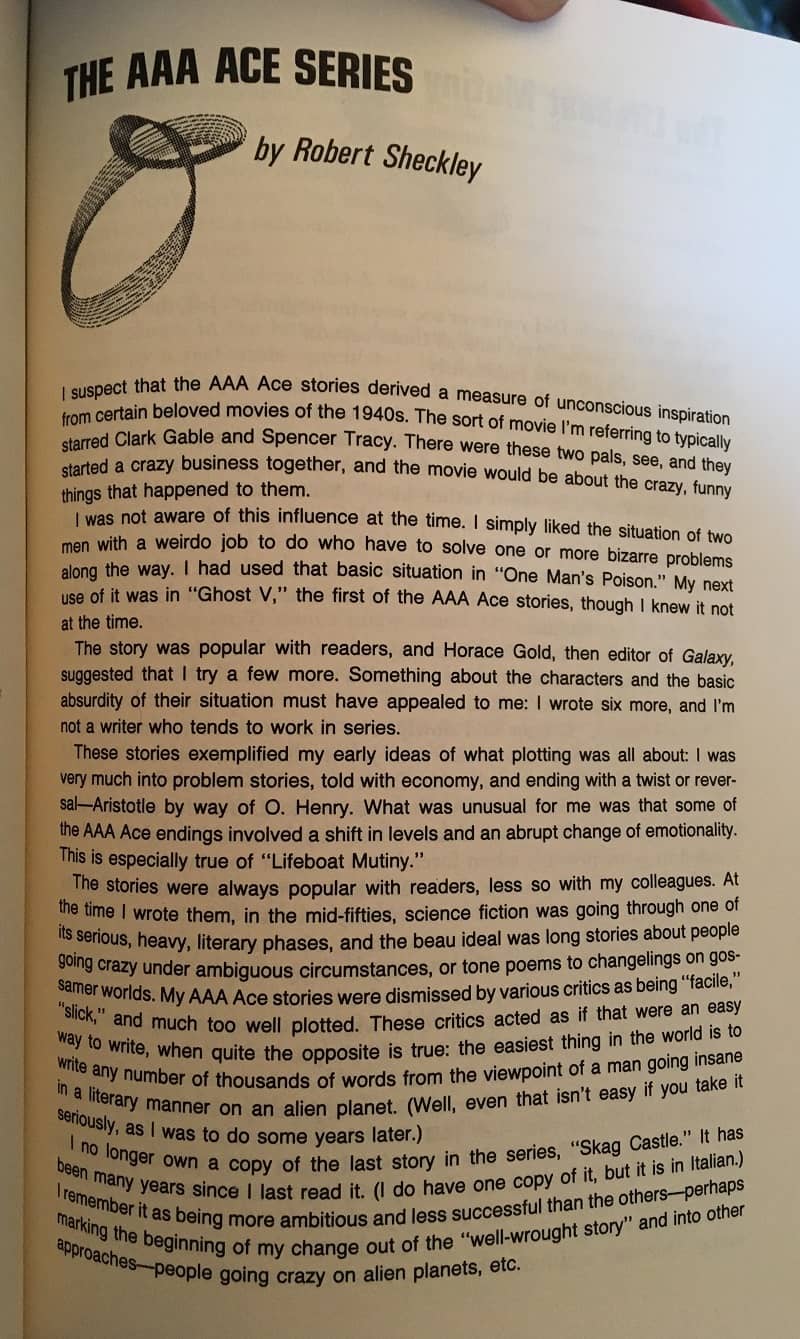
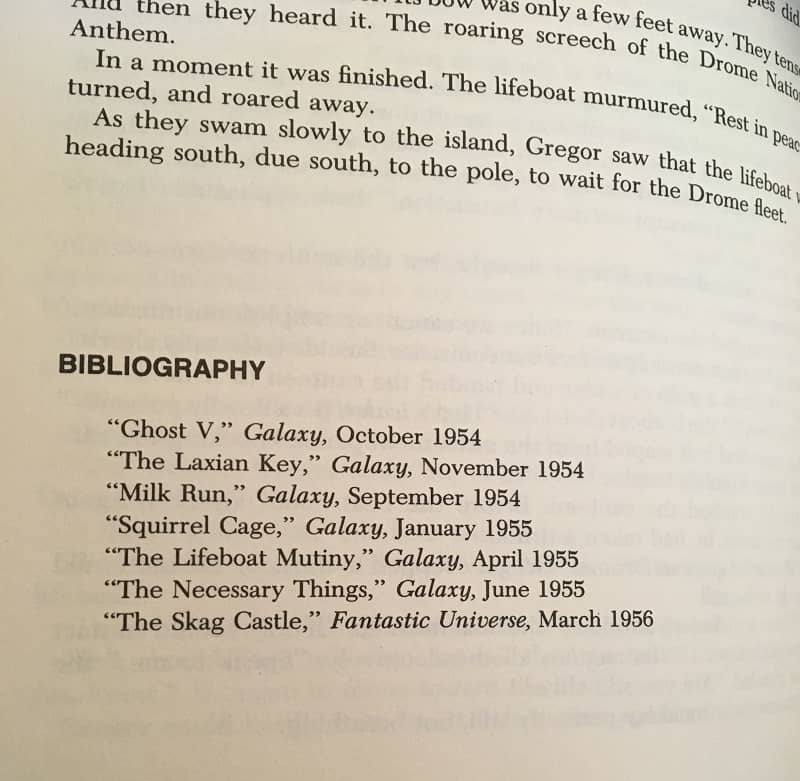
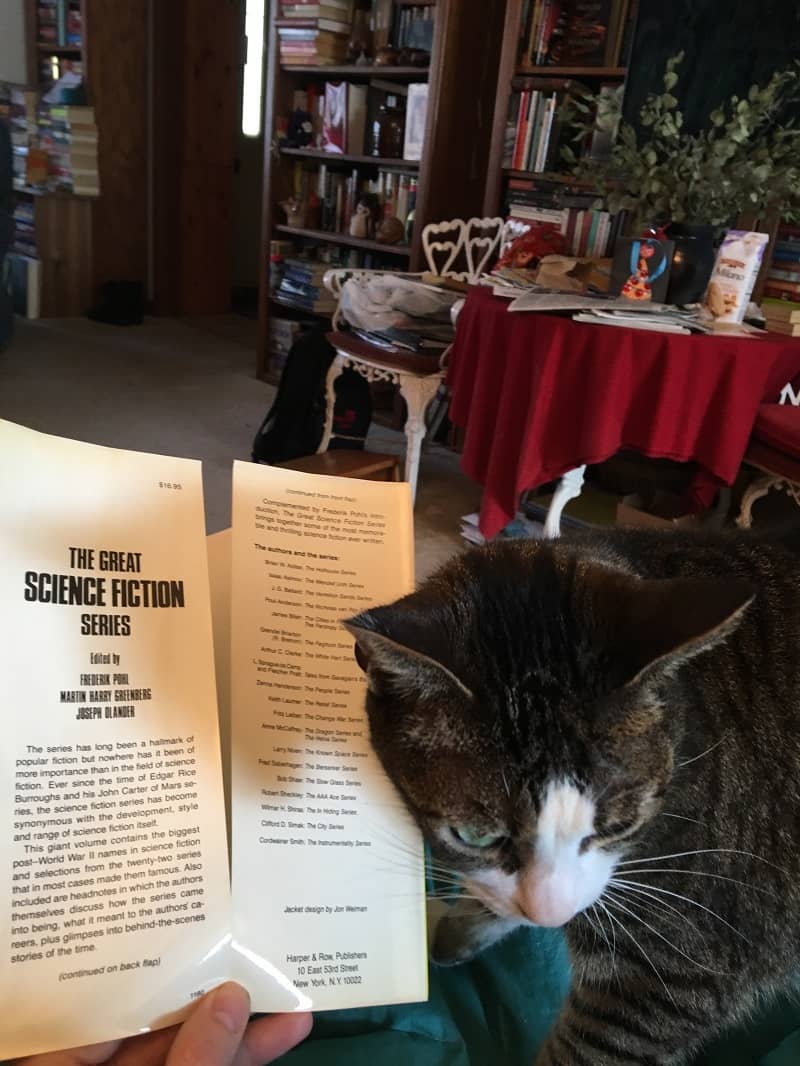
The key Change War story is Leiber’s Hugo-winning novel, The Big Time. I wasn’t aware that there were any others!
I just found a copy, in Very Good condition, on Biblio, John, for just under $60 — and ordered it. Biblio found me a copy of a short story collection by Silvia Moreno-Garcia a few months ago, asking only $8.95 + shipping; anyone else who had it at all wanted between $60-100 for it. And the book was in pristine condition. I got lucky — twice now. AbeBooks often gives me better deals than Amazon, and I’ve given up on Alibris. I only check Biblio as a last resort, but they’ve never disappointed me with respect to quality, and accuracy of description. Thanks for helping me spend more of my kids’ inheritance.
Thomas,
According to my spiffy new reference book there are six stories in the CHANGE WAR saga.
Interestingly, ISFDB has a much longer list of 10 stories, and lists four collections:
The Mind Spider and Other Stories (1961) — half of an Ace Double; all but one story is part of the CHANGE WAR
The Change War (1978) — Gregg Press
Changewar (1983) — Ace paperback
Snakes & Spiders: The Definitive Change War Collection (2012) — Creative Minority Productions
http://www.isfdb.org/cgi-bin/pe.cgi?4228
> I just found a copy, in Very Good condition, on Biblio, John, for just under $60
Smitty,
That’s cheaper than any of the copies I was able to find on online bookstores — well done. As always, I’m glad to have piqued your interest. Let me know what you think of it when it arrives!
I never saw that book — it looks interesting. But not $100 interesting, sad to say.
Love the cat!
> I never saw that book — it looks interesting. But not $100 interesting, sad to say.
Rich,
Have to agree with you there. But if you’re ever looking for a reprint prospect for Prime Books…
Also, I figured you’d be able to fill me in on the “Wendell Urth” series. Am I the only one who’s never heard of it?
> Love the cat!
Cats keep showing up every time I take these book shots…
I now have a bad case of Want, but not enough to shell out that much dough. Darn.
I SURE HOPE THIS GETS REPRINTED!
Send John a fruitcake and he’ll will his copy to you.
I hate the fact that I’m so predictable.
Oh, “Lifeboat Mutiny” by Robert Sheckley. “Geezel, yum!” If I remember correctly, “The Laxian Key” is a story about the danger of being drunk (in exactly the Douglas Adams sense).
I note that Matthew Wuertz, in his long-running project to review every issue of Galaxy in order, has reached May 1954:
https://www.blackgate.com/2018/12/02/galaxy-science-fiction-may-1954-a-retro-review/
The first AAA Ace story, “Ghost V,” appeared in Galaxy in October 1954, and “The Laxian Key” the very next month. I look forward to reading Matt’s review, which I anticipate should appear in the next few months.
[…] great web site, BLACKGATE.COM. John O’Neill reviewed this forgotten classic book from 1980 here.. I had never heard of this book before reading John O’Neill’s review. John also pointed […]